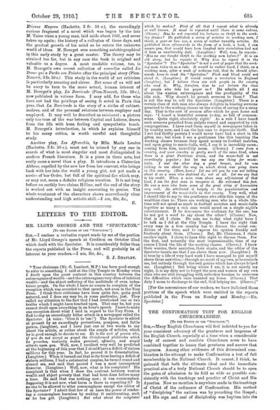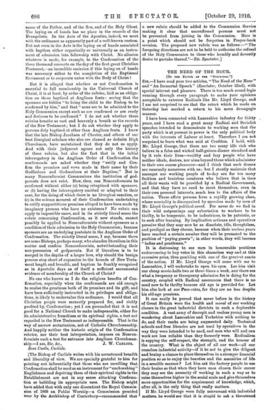THE CONFIRMATION TEST FOR ENGLISH CHURCHM.ANSHIP.
i70 TRY EDITOR OF THE "SPECTATOR:9 SIR,—Many English Churchmen will feel indebted to you for your consistent advocacy of the greatness and largeness of the English Church, especially at a time when a considerable body of earnest and resolute Churchmen seem to have combined together to lessen that greatness and narrow that largeness. Among other evidences of this determined com- bination is the attempt to make Confirmation a test of full membership in the National Church. It cannot, I think, be gainsaid that both the ultimate ideal and the immediate practical aim of a truly National Church should be to open the gates of admission to its fold as wide as possible con- sistently with the teachings and practice of Christ and His Apostles. Now no mention is anywhere made in the teachings of Christ of the ordinance of Confirmation. His method of "discipleing " the nations was by preaching the Gospel ; and His sign and seal of discipleship was baptism into the
name of the Father, and of the Son, and of the Holy Ghost. The laying on of hands has no place in the records of the Evangelists. In the Acts of the Apostles, indeed, we meet with the ordinance as apparently part of a well-known custom. But not even in the Acts is the laying on of hands associated with baptism either organically or universally as an instru- ment of admission into fellowship with Christ. No allusion whatever is made, for example, to the Confirmation of the three thousand converts on the day of the first great Christian Pentecost,—an incredible omission if this laying on of hands was necessary either to the completion of the Baptismal Sacrament or to corporate union with the Body of Christ !
But it is alleged that whether or not Confirmation is essential to full membership in the Universal Church of Christ, it is at least, by order of the rubrics, laid as an obliga- tion on those baptised at Anglican fonts : seeing that the sponsors are bidden "to bring the child to the Bishop to be confirmed by him," and that " none are to be admitted to the Holy Communion except such as are confirmed or are ready and desirous to be confirmed." I do net ask whether these rubrics breathe as vast and heavenly a breath as the records of the New Testament ; but I do ask whether they apply to persons duly baptised at other than Anglican fonts. I know that the late Bishop Jacobson of Chester, and others of our best liturgical scholars who also are classed as definite High Churchmen, have maintained that they do not so apply. And with their judgment agrees not only the history of these rubrics, but also the fact that in the initial interrogatory in the Anglican Order of Confirmation the confirmands are asked whether they "ratify and Con- firm the promises and vows made in their name by their Godfathers and Godmothers at their Baptism." But in many Nonconformist Communions the institution of god- parents does not exist. How, then, can Nonconformists be confirmed without either (a) being rebaptised with sponsors, or (b) having the interrogatory omitted or adapted to their case, for the doing of which there is no liturgical sanction, or (c) in the solemn moment of their Confirmation undertaking to ratify supposititious promises alleged to have been made by imaginary persons who have no existence ? No rubric can apply to impossible cases, and in its strictly literal sense the rubric concerning Confirmation, as it now stands, cannot possibly be applied to Nonconformists without sponsors as a condition of their admission to the Holy Communion ; because sponsors are an underlying postulate in the Anglican Order of Confirmation. The strictly literal sense, I say, because there are some Bishops, perhaps many, who abandon literalism in this matter and confirm Nonconformists, notwithstanding their non-possession of godparents. But if literalism is to be merged in the depths of a larger love, why should the benign process stop short of expansion to the bounds of New Testa- ment length and breadth, and baptism be frankly recognised as in Apostolic days as of itself a sufficient sacramental evidence of membership of the Church of Christ ?
No one who knows as I do the religious benefits of Con- firmation, especially when the confirmanda are old enough to realise the greatness both of its promises and its gift, and have been sufficiently instructed in its privileges and obliga- tions, is likely to undervalue this ordinance. I would that all Christian people were earnestly prepared for, and richly profited by, Confirmation ; yet I am persuaded that it is not good for a National Church to make indispensable, either for its administrative franchises or its spiritual rights, a test not regarded in the New Testament as indispensable. That is the way of narrow sectarianism, not of Catholic Churchma.nship. And happily neither the historic origin of the Confirmation rubrics, nor their best interpretation, imposes on Noncon- formists such a test for entrance into Anglican Churchman-
The Bishop of Carlisle writes with his accustomed breadth and liberality of view. We are specially grateful to him for pointing out inferentially that those who are unwilling that Confirmation shall be used as an instrument for "unchurehing" Englishmen and depriving them of their spiritual rights in the Establishment are not in any sense attacking Confirma- tion or belittling its appropriate uses. The Bishop might have added that with only one dissentient the Royal Commis- sion of 1868 on Public Worship—a Commission presided over by the Archbishop of Canterbury—recommended that
a new rubric should be added to the Communion Service making it clear that unconfirmed persons must not be prevented from joining in the Communion. Here is a point which should not be forgotten in Prayer-book revision. The proposed new rubric was as follows :—" The foregoing directions are not to be held to authorise the refusal of the Holy Communion to those who humbly and devoutly desire to partake thereof."—En. Spectator.]















































 Previous page
Previous page